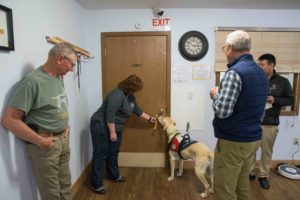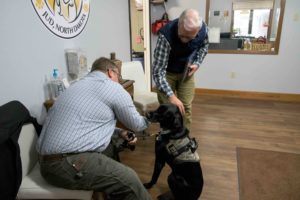
JUD, N.D. (NewsDakota.com) – U.S. Senator Kevin Cramer (R-ND), member of the Senate Veterans’ Affairs Committee, toured the Service Dogs for America site yesterday, October 13th.
Senator Cramer was invited to tour the site following his work on the Puppies Assisting Wounded Servicemembers (PAWS) for Veterans Therapy Act, Senator Cramer’s bipartisan legislation to expand access to service dogs for veterans. The senator introduced the bill in March and it was signed into law in August.

“Service dogs have changed, and even saved, the lives of many veterans with mobility impairments,” said Senator Cramer. “Today’s visit was proof of our legislation in action, and it was eye-opening to see how these service dogs are trained up to serve our veterans. Thank you Service Dogs for America for the great work you do and for hosting us today.”
The tour focused on how the PAWS for Veterans Therapy Act will make a difference for veterans. Service Dogs for America is the only Assistance Dogs International accredited program that does not have a wait list for medically approved applicants to receive their service dog. This means as soon as the applicant is medically approved, they can select their training dates.

The number of veterans with mental health conditions such as post-traumatic stress disorder (PTSD) and substance use increased from 27 percent in 2001 to more than 40 percent in 2014, and an average of 20 veterans per-day died by suicide in 2014. The PAWS for Veterans Act aims to reduce veteran suicide connected to mental health conditions by partnering veterans experiencing symptoms of PTSD and other post-deployment issues with service dogs. Given the track record dog therapy programs have of reducing symptoms associated with PTSD, the PAWS Act expands access for veterans diagnosed with PTSD to receive service dogs regardless of whether they have mobility issues.
